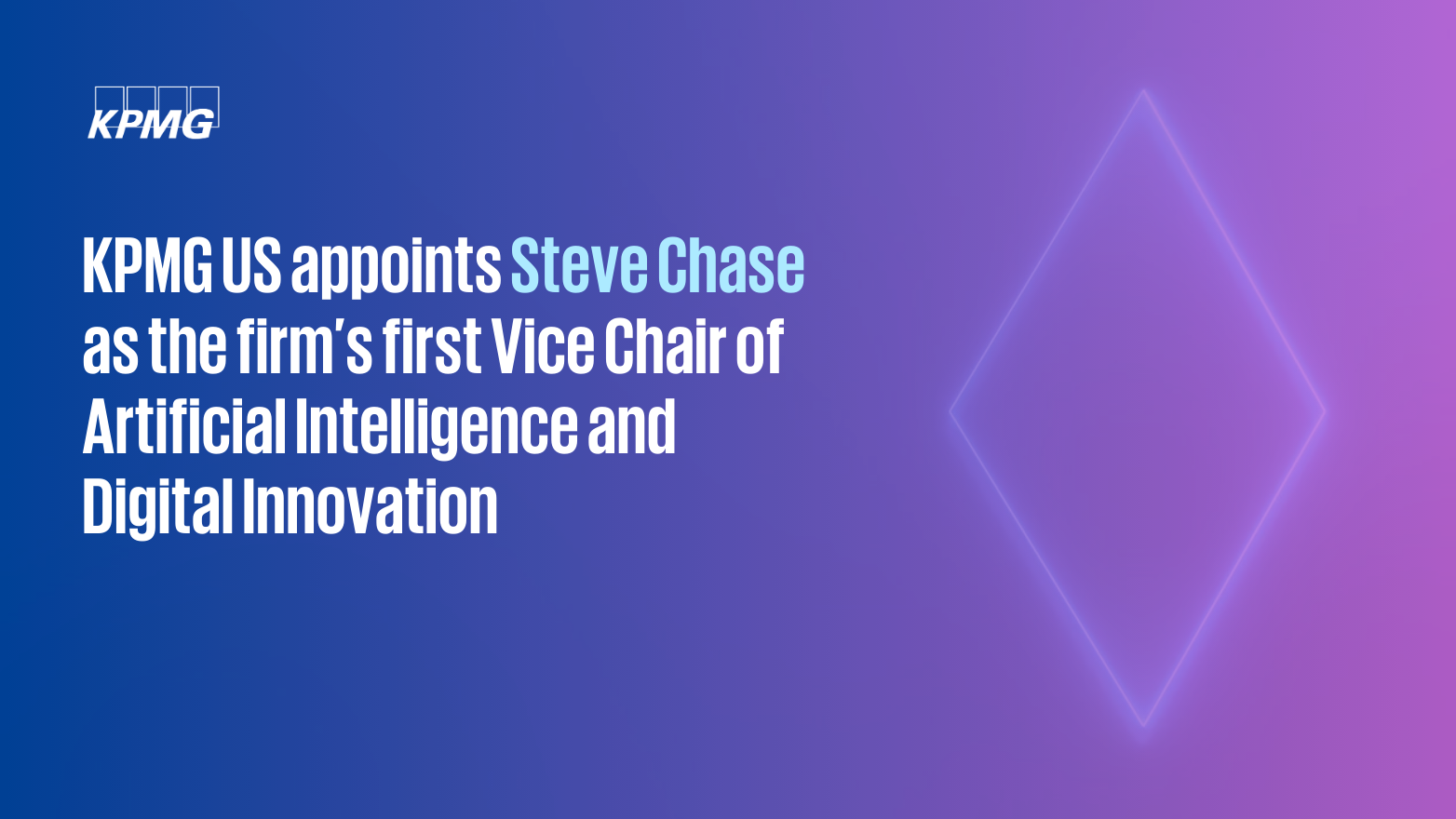KPMG Study: CEOs Focused on Game-Changing Investments in M&A and Generative AI to Drive Growth
-- CEO Confidence in Long-Term Growth Prospects of Their Companies More Subdued
-- Myriad Risks to Growth include Geopolitics and Political Uncertainty, Disruptive Technology
NEW YORK, Oct. 5 – CEOs are prioritizing investments in generative AI and are hungry for transformational M&A opportunities to drive growth, but confidence in the long-term growth prospects of their companies is subdued due to heightened geopolitical risk and ongoing economic uncertainty, according to a new study released today by KPMG LLP, the U.S. audit, tax, and advisory firm.
“Increased disruption and structural changes to the economy are compounding risks, requiring CEOs to move forward with long-term growth strategies, while remaining agile to take advantage of new opportunities and respond to unforeseen challenges,” said Paul Knopp, KPMG U.S. Chair and CEO. “Strategic investments in generative AI, ESG and transformational M&A opportunities promise returns when executed effectively, but a more fragmented global economy elevates supply chain, cyber, regulatory and other risks.”
The 2023 KPMG CEO Outlook features insights from more than 1,300 CEOs at large companies globally, including 400 in the United States, on the key challenges and opportunities in driving business growth with a lens into managing “compound volatility.” Key perspectives from U.S. CEOs are highlighted below.
CEOs remain confident in long-term growth prospects of the economy, but confidence is more subdued when it comes to growth prospects of their companies.
Knopp: “Geopolitical risks are top of mind for CEOs, a reflection of an increasingly fragmented global economy that is more susceptible to external shocks.”
- U.S. CEOs are confident in the growth prospects for their country (84%) and the global economy (77%) over the next three years. CEO confidence in the growth prospects for their company (79%) is more subdued than in 2022 (95%).
- When asked about their earnings outlook over the next three years, nearly half (49%) of U.S. CEOs expect growth of 0.01-2.5%; 24% expect 2.5-5% growth.
- CEO perspectives on the top risks they see for their organizations reveal the impact of increased disruption and the challenges of navigating long-term structural change.
- U.S. CEOs cite geopolitics and political uncertainty as well as emerging/disruptive technology as top risks posing the greatest threats to growth over the next three years.
- 28% of CEOs feel under-prepared for a cyber attack, with increasing cyber attack threat and sophistication (35%), shortage of skilled personnel (25%) and vulnerable legacy systems and infrastructure (19%) as the main reasons.
- When asked to identify the top trends that could negatively impact their organization’s prosperity over the next three years, U.S. CEOs cited cost of living (80%), regulatory demands (77%) and disruptive technology (76%).
- U.S. CEOs cite geopolitics and political uncertainty as well as emerging/disruptive technology as top risks posing the greatest threats to growth over the next three years.
Generative AI is top investment priority, but CEOs are wary of navigating ethical challenges and lack of regulatory guidance.
Knopp: “Generative AI is a promising pathway to growth that is rapidly accelerating the rate of innovation in our economy. However, CEOs must engage their workforce to drive both ethical and effective use of generative AI.”
- 72% of U.S. CEOs say generative AI is a top investment priority despite uncertain economic conditions, and the majority are placing more capital investment in buying new technology (57%) than developing their workforce’s skills and capabilities (43%).
- 62% of CEOs expect to see return from their investments in generative AI in three-to-five years, while 21% expect returns in just one-to-three years.
- When asked to identify the top benefit of implementing generative AI in their organization, CEOs cited increased profitability, new product and market growth opportunities, increased innovation, and help with fraud detection and cyber attack response.
- 85% see generative AI as a double-edged sword, aiding detection of cyber attacks while also providing new attack strategies for adversaries.
- 81% believe that the lack of current regulations and direction for generative AI within their industry will be a barrier to their organization's success, with most (77%) believing that the degree of regulations regarding generative AI should mirror that for climate commitments.
- When asked to identify the biggest challenges when it comes to implementing generative AI, CEOs identified ethical challenges (52%), cost of implementation (50%), lack of regulation within the space (49%), and technical capability and skills (48%).
CEOs demonstrate high appetite for transformational M&A but need more stable market conditions.
Knopp: “Green shoots are popping up in the IPO market, which bodes well for M&A, as successful IPOs give confidence to buyers and sellers in the M&A market.”
- 54% of U.S. CEOs indicate they have a high M&A appetite and will likely undertake acquisitions that have a significant impact to their overall organization over the next three years. 35% identified stable market conditions as the most crucial precondition to prioritize inorganic growth over organic growth, followed by addressing the competitive landscape (18%) and availability of financing (18%).
CEOs expect significant returns from ESG investments and fear inaction will result in losing out on top talent.
Knopp: “Today, CEOs are maturing their ESG strategies to advance specific decarbonization and sustainable finance efforts to drive financial returns as well as strengthen M&A and operational strategies to gain a competitive edge.”
- 58% of U.S. CEOs expect to see significant returns from their ESG investments in the next three-to-five years with 24% predicting one-to-three years, while 74% report that they have fully embedded ESG into their business as a means of value creation.
- Over the next three years, U.S. CEOs see their ESG strategy having the greatest impact on building customer relationships (26%), driving financial performance (18%) and building brand reputation (16%).
- When asked about the principal downside of failing to meet stakeholder expectations when it comes to ESG, CEOs cited recruitment challenges (26%), competitors gaining an edge (22%) and higher cost of and/or difficulty in raising finance (21%) most frequently.
- 79% believe that they have the capability and capacity required to meet reporting standards.
- 43% of U.S. CEOs say they have changed the language in which they use to refer to ESG internally and externally.
CEOs envision a future with more workers coming into the office and will reward those that do.
Knopp: “CEOs certainly want more in-person work, but return-to-office strategies cannot be one-size-fits-all – they require a deep understanding of employee dynamics and barriers to more in-person activity.”
- 62% of U.S. CEOs envision the working environment for corporate employees whose roles were traditionally based in-office to be back in the physical workplace in the next three years – a marked shift from 2022 (34%). 34% envision these roles to be hybrid (45% in 2022) and only 4% envision them being fully remote (20% in 2022).
- 90% say they will reward employees who make an effort to come into the office with favorable assignments, raises or promotions.
CEOs are continuing to prioritize talent and culture in fast-changing environment.
Knopp: “Ethical cultures improve operational resilience and accelerate transformation. Facing risks today, there is clearly an ethics premium in the market.”
- U.S. CEOs cite their employee value proposition to attract and retain top talent as their top operational priority to achieve their growth objectives over the next three years.
- CEOs believe that employee attitudes about corporate reputation (62%), national or local politics (61%), generational differences in the workforce (60%) and competition with industry peers (60%) will be the most influential factors shaping corporate culture over the next three years.
- 83% say their organization's business success, including growth objectives, depends on their company having a strong ethical culture.
About KPMG’s CEO Outlook
The KPMG CEO Outlook provides an in-depth three-year outlook from global executives on enterprise and economic growth.
The report surveyed 1,325 CEOs in 11 key markets (Australia, Canada, China, France, Germany, India, Italy, Japan, Spain, U.K. and U.S.) and 11 key industry sectors (asset management, automotive, banking, consumer and retail, energy, infrastructure, insurance, life sciences, manufacturing, technology, and telecommunications).
All respondents have annual revenues over U.S.$500M and more than one-third of the companies surveyed have more than U.S.$10B in annual revenue. The survey was conducted between August 15 and September 15.
About KPMG LLP
KPMG LLP is the U.S. firm of the KPMG global organization of independent professional services firms providing audit, tax and advisory services. The KPMG global organization operates in 143 countries and territories and has more than 265,000 people working in member firms around the world. Each KPMG firm is a legally distinct and separate entity and describes itself as such.
KPMG is widely recognized for being a great place to work and build a career. Our people share a sense of purpose in the work we do, and a strong commitment to community service, inclusion and diversity and eradicating childhood illiteracy. Learn more at www.kpmg.com/us.
Dive into our thinking :
KPMG 2022 U.S. CEO Outlook
Download PDFExplore more

KPMG Establishes New AI and Digital Innovation Group
KPMG LLP announced the establishment of an AI and Digital Innovation group led by a newly named Vice Chair, Steve Chase. Read more.

KPMG's 2023 U.S. Talent Trends Survey
The majority of white-collar workers don’t feel generative AI is an immediate threat to their jobs; want to be upskilled.

KPMG and Microsoft enter landmark agreement to put AI at the forefront of professional services
Multi-year cloud and AI alliance to supercharge the employee experience and accelerate innovation for clients across Audit, Tax and Advisory

